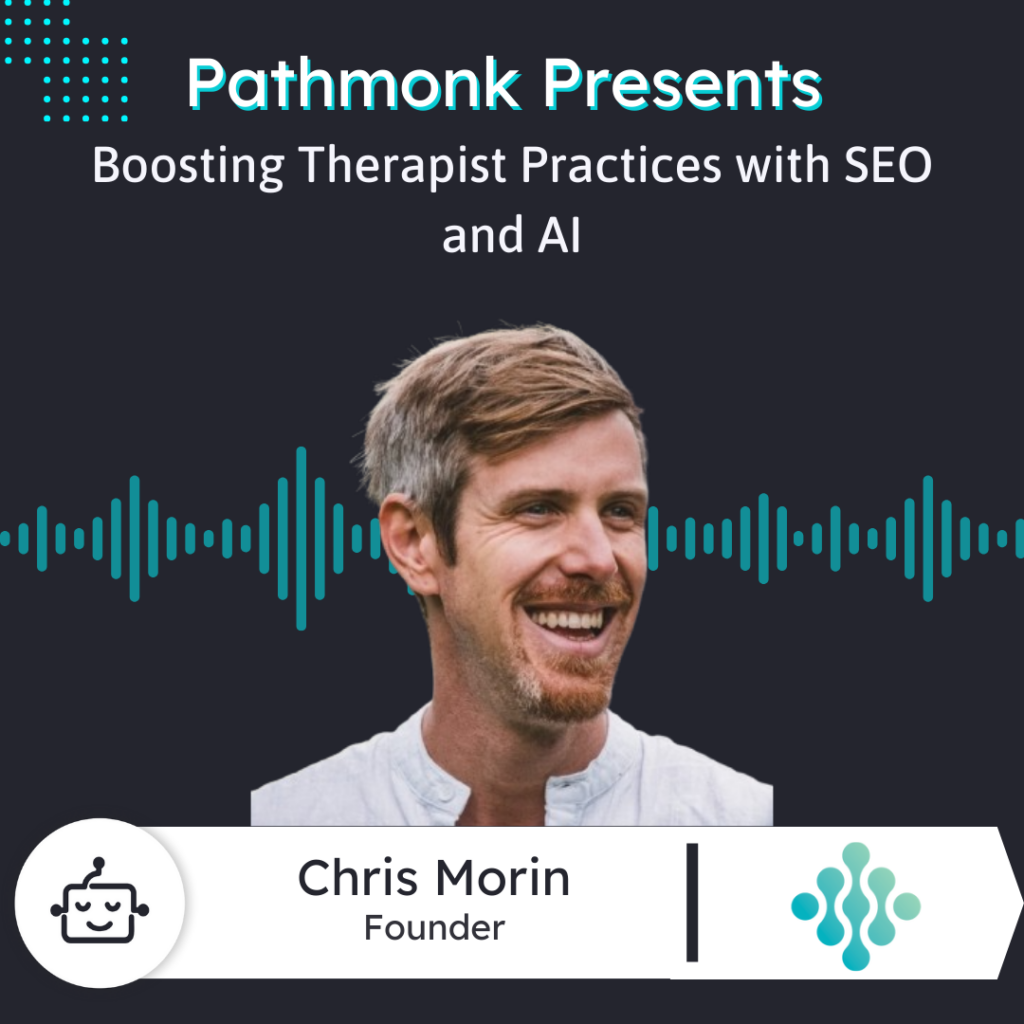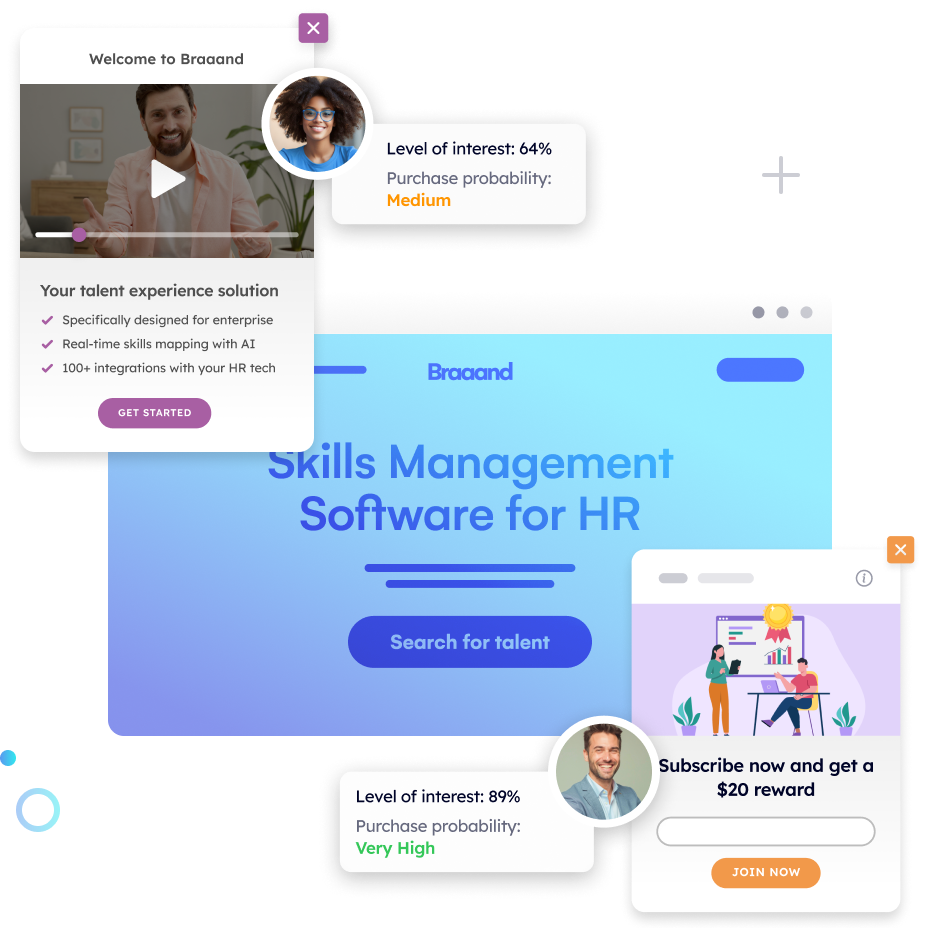
Introduction
On Pathmonk Presents, we sit down with Chris Morin, founder of Moonraker, an SEO agency specializing in mental health practitioners.
Chris shares how Moonraker bridges the tech literacy gap for therapists, helping solo practitioners and group practices scale through targeted SEO, AI, and CRO strategies.
Learn about their unique approach to lead generation via collaboration partnerships, the power of social proof on websites, and why streamlining the client journey is key.
Chris also reveals his innovative use of AI tools and his vision for scalable SaaS products, offering actionable insights for marketers in niche industries. Don’t miss this episode!
Increase +180% conversions from your website with AI
Get more conversions from your existing traffic by delivering personalized experiences in real time.
- Adapt your website to each visitor’s intent automatically
- Increase conversions without redesigns or dev work
- Turn anonymous traffic into revenue at scale

Kevin: Hey everybody, welcome back to Pathmonk Presents. Pathmonk is the AI for website conversions. With increasing online competition, over 98% of website visitors don’t convert. The ability to clearly communicate your value proposition and support visitors in their buying journey is what separates you from the competition.
Pathmonk qualifies and converts leads on your website by identifying where visitors are in their buying journey and influencing them in key decision moments with relevant micro-experiences like case studies, intro videos, and more. Stay relevant to your visitors and increase conversions by 50% by adding Pathmonk to your website in seconds. Let the AI do the work while you continue your regular marketing efforts. Check us out at Pathmonk.com.
We’re really looking forward to today’s episode. We’ve got Chris Morin from Moonraker joining us. Chris, how are you?
Chris Morin: Great, Kevin. Nice to be here.
Kevin: Thanks for joining! Chris is the agency owner at Moonraker, and we’re excited to hear his insights on marketing for their clients. But before we dive too deep, tell us—what is Moonraker, and what are you all about?
Chris Morin: Moonraker is primarily an SEO agency focused on therapists and mental health professionals. We’re also moving more into CRO and leveraging AI as much as possible. Funny enough, our domain is Moonraker.ai—I picked that about seven or eight years ago, long before we were actually using AI. I just knew it was coming, and here we are.
Kevin: Bit of a premonition there. Let’s talk about your clients. You mentioned you work in the mental health space. What problems are you solving for them, and what services do they typically come to you for?
Chris Morin: I used to be a massage therapist, so I met a lot of wellness professionals who are incredible at their work but lack digital marketing knowledge. Many believe that if they just put out the right energy, the right clients will come. While that’s a beautiful idea, in practice you still need a website—or at least a business card.
There’s a real tech illiteracy in the space. I happen to straddle both worlds—wellness and tech. Over time, I shifted from practicing massage to helping other wellness providers grow. The ideal client for us is a group practice aiming to scale. Most of our current clients are solo practitioners who have websites that no one can find and little understanding of how to generate leads.
Kevin: You mentioned tech illiteracy in the industry. Is that still a common problem, or is it improving?
Chris Morin: It’s changing, but slowly. I spend a lot of time in Facebook groups where therapists are trying to learn marketing. It’s one of the few niches where Facebook still thrives, especially with women aged 30 to 50. Younger therapists are more tech-savvy, but there’s still a general resistance to sales and marketing language. So I change the terminology—”sales funnel” becomes “client journey.” They don’t want to feel salesy; they want to feel compassionate. That resistance sometimes keeps them from learning what they need to know.
Kevin: How do these clients usually find you? I assume SEO plays a part, but is there more to it?
Chris Morin: Ironically, our website is almost secondary. Almost all our leads this year have come from partnership collaborations. I do a lot of outbound cold email, targeting Facebook group owners and brands that sell coaching or educational services to therapists. I offer value to those communities through webinars and podcasts.
I’m not worried about sharing too much. I can give away 99% of our strategy and people will still come to us—they don’t want to do it themselves. These leads are incredibly warm because they come via trusted introductions.
Kevin: That’s like high-impact social proof. When someone the community trusts says you’re the go-to expert, half the sales job is already done.
Chris Morin: Exactly. When a Facebook group owner with 20,000 members says, “We use Moonraker for our SEO,” people take that as gospel.
Kevin: Let’s shift to your website. What strengths or weaknesses does it have? I know it’s not your main lead generator, but how does it support your business?
Chris Morin: I’m really happy with the site right now—it’s been years in the making. For businesses like ours, where most sales happen on consultation calls, the website is more of an interactive business card and a hub for social proof.
I focus on four critical elements in the hero section:
The “why” – an emotionally impactful slogan.
The “what” – a short description of the services.
Social proof – credentials, logos, testimonials.
A clear call to action.
The homepage is 85% social proof. We showcase results, testimonials, and recognizable brand logos. The rest of the site doesn’t get much traffic; most people just find the booking link and schedule a call.
Kevin: That makes sense. When I look for a healthcare provider, I want to know: Are they qualified? Do others say they do a good job?
Chris Morin: Exactly. And the sooner you get someone to book, the better. If they use a contact form, they might forget they ever reached out. But if they schedule a call, they usually pause their search until that conversation happens.
Kevin: Sounds like your primary website conversion is bookings. So in your view, what makes a great converting website?
Chris Morin: I’d definitely mention Pathmonk—we use it with clients when it fits. A great website is fast, mobile-friendly, and meets the user right when they’re ready to act. There should always be a call-to-action within view—buttons, sticky menus, chat widgets. Especially with distressed users, like those seeking therapy, they’re not going to read every detail. They need to talk to someone. So everything should guide them to that.
Kevin: That’s such a good insight—people may only be ready to act for a few seconds. If there’s nothing there, you lose them. Let’s shift gears. What’s a day in your life like at Moonraker?
Chris Morin: I’m currently hiring an integrator to offload things I shouldn’t be doing anymore. My ideal day is sales calls, podcasts, webinars, and dreaming up new ideas. Right now, I’m still monitoring our SEO team and reviewing content. I love inspiring action, but I don’t love client success management—that’s someone else’s role.
Recently, we built a slick pre- and post-assessment tool for a client using AI development platforms. Now I’m thinking about productizing it—building low-cost SaaS tools tailored to therapists. The goal is to move away from high-touch services and into scalable products.
Kevin: So you’re the innovator. You need an integrator to handle the rest.
Chris Morin: Exactly.
Kevin: Where do you go to keep learning and improving?
Chris Morin: I read a lot—mostly wellness and self-improvement books. But my favorite learning tool is AI itself. I talk to platforms like ChatGPT and Claude all the time. They’re like creative partners. I use development-focused AI tools to build prototypes, solve problems, or even recreate bloated tools in a more streamlined way. It’s reawakened my creativity.
Kevin: You’re the first guest to say they learn primarily from talking to AI. That’s awesome. Let’s end with some quick-fire questions. What’s the last book you read?
Chris Morin: Never Split the Difference by Chris Voss. Incredible negotiation strategies. I use the techniques every day, both professionally and personally.
Kevin: If you could fix one thing in your marketing role with no tech boundaries, what would it be?
Chris Morin: I’d love a tool where I just have a conversation with a client, and it generates and deploys an entire omnichannel marketing strategy automatically. Also, one that draws fingers correctly in AI-generated images.
Kevin: And what’s one repetitive task you’d automate?
Chris Morin: Client reporting. I make monthly recap videos, which are helpful but time-consuming. If I could have a video of “me” doing it while I sleep, that would be perfect.
Kevin: Last one—what advice would you give yourself if you were just starting out in marketing?
Chris Morin: Just keep going. I might feel like I started late, but this wasn’t even possible earlier. The difference between a pro and an amateur is that a pro shows up, even when they don’t feel like it. That’s what I’d tell myself.
Kevin: Very wise words. Chris, it’s been a pleasure. If anyone in the mental health space needs SEO, check out Moonraker and talk to Chris. Thanks for joining us today.
Chris Morin: Thanks, Kevin.



